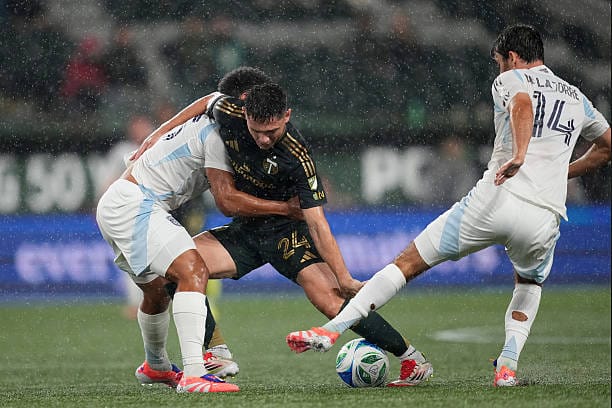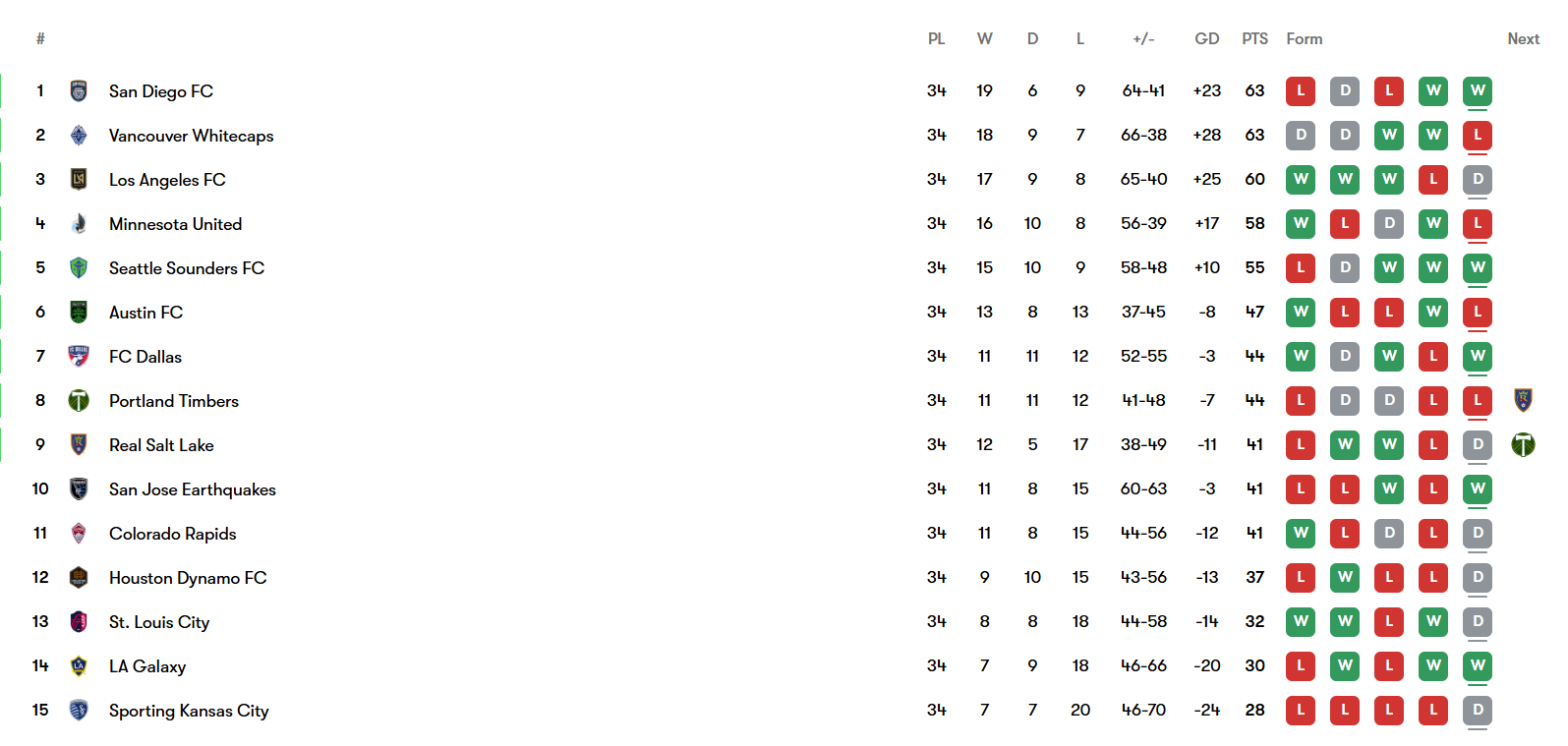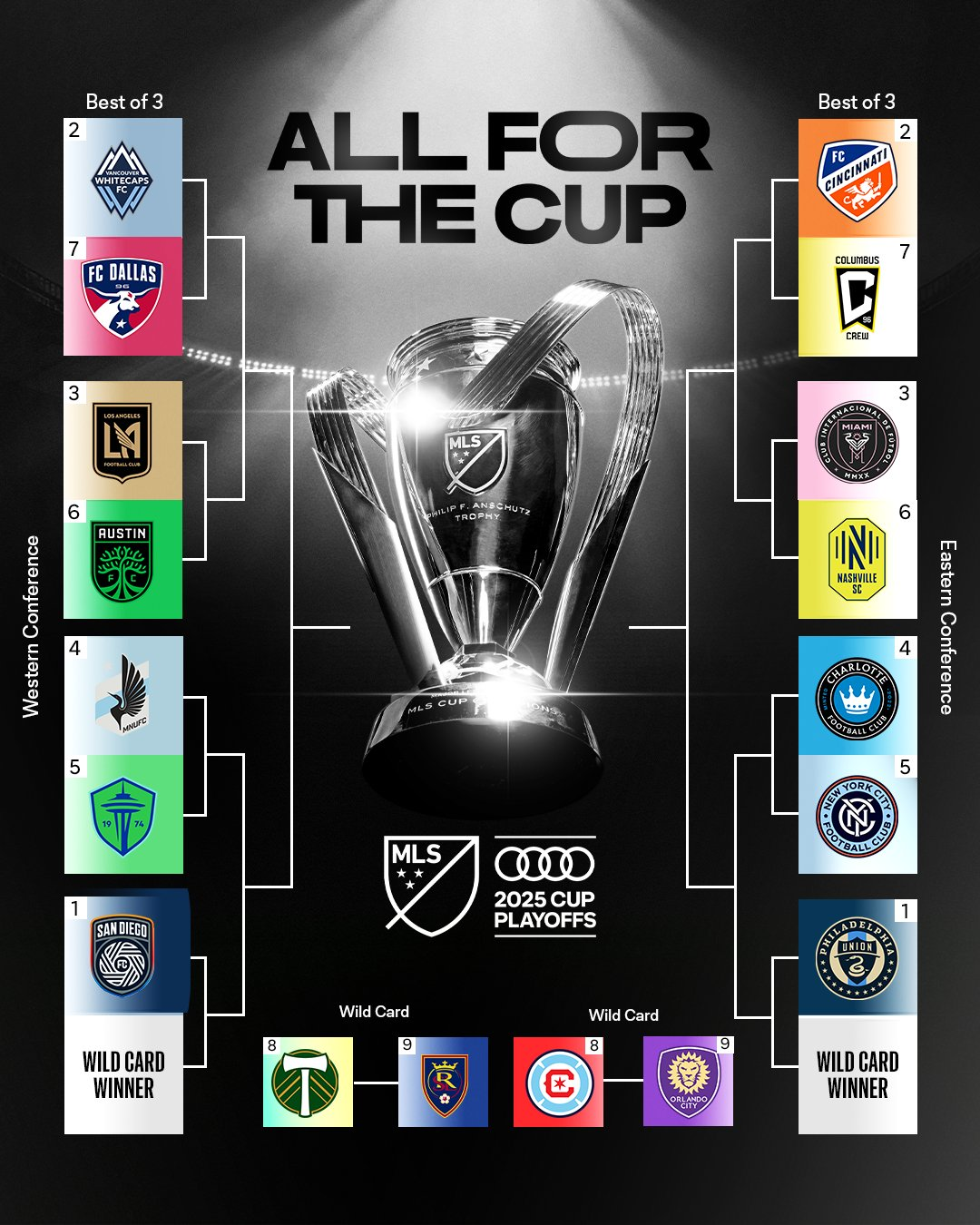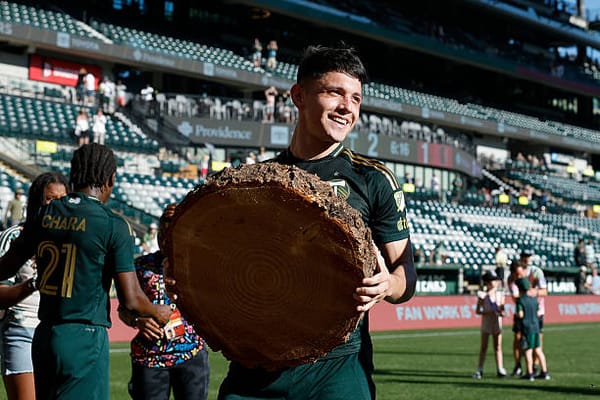The Holes in the Canoe

It’s becoming a Decision Day tradition. The Portland Timbers humiliated themselves again. For the third time in five years, a visiting team (San Diego in this instance) celebrated a milestone on Providence Park’s pitch.
Recap
The events of this game don’t really matter. But I’ll go through the major ones. After all, someone needs to properly do their job tonight.
Sixteen minutes into the game, Amahl Pellegrino missed a golden chance in front of Portland’s net. One minute later, Kristoffer Velde put a shot wide of the far post. That San Diego chance was created by the Timbers making a careless mistake in possession.
In the case of Pellegrino’s missed chance, James Pantemis decided to play a suicide pass right up the middle to Cristhian Paredes. The Paraguayan was not able to control the ball, and it allowed San Diego to walk right up to the doorstep of Portland’s goal. The Portland Timbers would not learn from this mistake. Someone else was going to make an error and gift San Diego a goal.
That someone was David Da Costa. In the 26th minute, Kevin Kelsy won the ball in the air and chested it to the Portuguese playmaker. He was immediately pressured, and was forced into a backpass. This pass completely missed Paredes and went right to Anders Dreyer. The Danish MVP candidate was able to slip a pass through to Pellegrino, who slotted it past Pantemis for a 1-0 San Diego lead. The rest of the first half was completely uneventful from a Portland perspective. Good teams consistently provide a threat to the opposing goal. The Timbers were barely able to threaten San Diego’s box.
However, it was only 1-0 at halftime and the Timbers were not out of it. Despite a putrid first half where they were outshot 6-3 and had zero semblance of control, this game wasn’t over.
But it was over in the 47th minute. A body feint from Jeppe Tverskov allowed him to bypass Joao Ortiz (now in the midfield after spending the first half at center back) and progress the ball to Pellegrino in space on the left wing. Dreyer picked up the ball at the top of the box and fired a rocket past Pantemis at the Canadian’s near post. On the surface, it’s a fine goal. Is it preventable? Yes. Did San Diego walk through Portland’s structure? Yes.
How about a third goal two minutes after Dreyer’s worldie? Da Costa lost the ball again in San Diego’s half, and it only took one Tverskov through ball to send Dreyer charging forward in acres of space. This time, he finished it with a chip. It marked Da Costa’s second assist of the game, and both of them were for the opposing team.
Maybe the game was over at halftime after all. Just to make sure, San Diego added a fourth in the 63rd minute. Pantemis’ first-half mistake didn’t get properly punished, but punishment finally came when he passed the ball directly to Tverskov. One easy pass later and the ball was at Pellegrino’s feet again. Another calm finish increased San Diego’s lead to 4.
Portland’s only notable second-half chance came from a free kick in the 78th minute. Velde’s attempt was on target and forced CJ Dos Santos to make a save. That redirection fell to Felipe Mora, who continued his trend of failing to score a goal by putting the rebound directly at Dos Santos. After the 63rd minute, it was all garbage time. The Timbers opened the 2025 regular season with a 4-1 loss at home against Vancouver. They closed it with a 4-0 loss at home against San Diego, who finished the regular season on top of the Western Conference.
Are These Guys Good At Soccer?
Technically, yes. You can't be a bad soccer player and become a professional athlete. But this is a rhetorical question, and it's supposed to elicit a thought instead of an outright answer.
The canoe completely capsized tonight. There's no doubt about that. However, each of the paddlers decided that the Timbers were not using canoes in tonight's game. They brought their own kayaks.
It is so much easier to talk about this game using the boat metaphor than to go over every single mistake the Portland Timbers made. They're mistakes I've covered before. Nothing that happened tonight was a complete departure from what this team has shown since the end of Leagues Cup. They continued to live on the margins and the little things, but failed to execute the basics to a degree that hasn't been seen at all in 2025. They've been sloppy, passive, and wretched at various times throughout this season. But they haven't been this bad since the 3-0 loss in Toronto back in June.
This group of players has never been this degree of awful at home. You could talk about the season-opening capitulation against Vancouver, but the vast majority of that game featured a 10-man Timbers team. Many of those players had never played a game together. Tonight's game had one outlandish positional change but an attacking group that was familiar with each other. Instead of finding a consistent way to defend or attack, they doubled down on individuality and brought their kayaks to a canoe race.
San Diego is the master of the canoe. Mikey Varas knows exactly what kind of route he wants his boat to take. San Diego's players never had a second thought about where their teammates were. They were able to pass over, around, and through Portland's block and relied on their top players (Tverskov, Dreyer, and Pellegrino) to find each other in and around the box. This San Diego canoe is only one year old. But it's the most functional canoe in the West outside of Vancouver.
The Timbers, meanwhile, couldn't figure out how to paddle their own kayaks. By bringing their kayaks instead of committing to the canoe, they showed up and were already prepared to lose. Instead of recognizing that San Diego's press was going to suffocate them at every turn, they doubled down on playing out from the back. When every attacker wants the ball at their feet, no one is willing to sacrifice themselves to run off-ball and create space. They can't even properly move into space to create an opening to receive the pass. Every Timbers player turns into a hold-up striker. Are the players really that dumb? Or are they so bought into Neville's system that they are unwilling to try anything else?
I'll get to the coaching aspect later. But I can't entirely blame the coaching staff for an entire team that fails to properly control a pass. Bad first touches combined with pressure create turnovers and downhill attacks for opposition clubs. The Portland Timbers want to attack with speed, but fail to do anything that can achieve their desired pace. But do they even want to go fast? Or is that what everyone wants to see them do?
Every week I watch Major League Soccer. One of the biggest perks of the Apple deal is the ability to watch every single league game with no blackouts. Because of this, I can watch other teams play soccer and wonder, "Why can't the Timbers do this?"
What's stopping the Timbers from having an organized high press where every player is able to stay with their marker or zone? What's stopping the Timbers from completing simple passes through the center of the pitch? What's stopping the Timbers from receiving a basic pass under pressure? I see teams all around the league, many of them with worse records and less expensive players than Portland, succeed at doing the simplest things required to be COMPETITIVE in a soccer game. Forget winning for a second. Winning a game can be decided by the stupidest ways. Deflected shots, penalty calls, blown chances, or one player taking it upon himself to create something magical.
That last part is important. Let's come back to it later. The early-season Timbers were, above all else, hungry. They raced forward on the counterattack. Players should feel some kind of intrinsic motivation that pushes them to do whatever it takes to avoid losing. They'll force those key moments that are required to win a game of soccer. These players in green simply wanted to go through the motions and finish this game. They did not need to be world beaters in order to win tonight's game. They simply had to do the basics and find some magic. That's been the gameplan all year, in some way or another. And that's an indictment of everybody.
Modified Player Ratings
I'm not mad about this game. I'm simply disappointed. The ultimate expression of approval is a thumbs-up. On the other side of the coin, a hearty thumbs-down indicates disapproval. There is no need to quantify today's game with numbers. You can look at the xG battle, the possession battle, or anything else if you want numerical values. The thumbs will do all the talking tonight. There is also no particular order in this list. I'm merely matching the state of the team on the field: woefully disorganized.
David Ayala: Two Thumbs Up
Ayala continued to do all the dirty work and even played several tantalizing through balls. The result of those through balls were one of two outcomes: the teammate didn’t make the run or the teammate miscontrolled the pass. I wonder how those contract negotiations are going. Also noteworthy: he looked visibly upset in his post-game press conference.
Kevin Kelsy: Two Thumbs Up
The scapegoating of Kelsy gets more and more ridiculous after each passing game. Let’s take his performance tonight into account. In link-up play, he was excellent. You have to watch all aspects of his performance instead of the shots that he takes because he never gets opportunities to shoot. It’s like his teammates are purposely deciding not to cross the ball towards him in the box. Meanwhile, he actively pressed and kept trying to make something happen. It isn’t his job to make something happen, but he’s getting better at making late runs into the box. At one point in the first half (the exact minute is not in my notes, invoking the “Trust Me Bro” statute of 1999) he drifted out wide to receive the ball. After a quick pass, he immediately burst into the box. No cross or return pass came. It’s clear that he’s very intent on becoming a better player and learning all aspects of the position. If only someone would provide him with service.
Kristoffer Velde: Thumb Sticking Out at a 90 Degree Angle
I don’t think that Velde had a good game, but I don’t think he had a bad one either. His best chance to score came in the 9th minute when he missed a Da Costa cross by a half-step. However, he did test Dos Santos with a free-kick and won the foul that led to said free kick.
But he’s addicted to hero ball. It’s understandable to be desperate for a goal after making your first 8 appearances for your new club without opening your account. The Portland Timbers, however, do not need Velde to try every possible avenue to score. They need him to elevate the players around him. I think his best moment in a Timbers uniform was the last goal that the Timbers scored (in the 81st minute against Dallas). He flicks a pass over the backline and right onto the foot of Paredes. Teams are always expecting him to shoot because, well, he always shoots! I’d like to see some more all-around play from him on Wednesday.
Joao Ortiz: 45 Degree Angle Thumbs-Down
Joao Ortiz played scout-team center back over the summer, and Phil Neville liked enough of what he saw to give him a start at center back in a real game. I’m sure Ortiz was great for the scout team because he was playing against his own teammates, who do not provide any semblance of danger for any center back in this entire league.
That’s very mean, but it’s also objectively true. San Diego, on the other hand, are a threat to every blade of grass on the pitch due to their smart off-ball movement and defined system. The Portland Timbers have none of those things, so Ortiz had to be reactive while being played out of position. This led to some positioning errors that I’m willing to forgive because he is clearly not a center back. His performance wasn’t an abject disaster at the back, but he looked completely out of his depth when he returned to his natural position. Sigh.
Dario Zuparic: A Steady Thumbs-Up
How much blame can be put on a center back who is constantly defending on the back foot? Is it even fair to criticize him for being completely exposed by the mistakes of his teammates?
That’s the big-picture question. Zuparic was shaky, particularly because he kept stepping off his line to try and make a play. Sometimes it worked and sometimes it didn’t. I wish he tried more long balls to try and beat San Diego’s press.
Kamal Miller: Another Thumbs-Up, Why Not
The same thing that can be said about Zuparic also applies to Kamal Miller. I noticed early in the game that he was assigned to be Dreyer’s man-marker. I don’t know why Neville was intent on making Miller track Dreyer all over the field due to the space it opened up, but I thought he performed the task admirably in the first half.
Mati Rojas: One Thumbs-Up
Was Rojas effective? No, but he was at least trying to do something. He took three shots. Two came from free kicks, and neither of them found the target. His 69th-minute header was also off-target. It was clear that he wasn’t fully fit. More on that later.
Antony: Two Very Strong Thumbs-Down
He just hasn’t been the same player since returning from injury. And it looks like a mental block rather than physical. Tonight, the Timbers needed Antony to make the proper decision. He consistently made the incorrect one. His first touch was all over the place. Somehow, he stayed on the pitch for the entirety of the game. More on that later.
Ian Smith: Two Strong Thumbs-Up
Smith became a casualty of Portland’s mid-game switch to the 4-2-3-1. It’s clear that he’s the first-choice left wingback, and he wasn’t going to be on the field with Jimer Fory occupying the left back spot. I don’t think it’s hyperbolic to say that Smith was one of Portland’s best players during that first half. He completely understands his role as a two-way threat and service provider. That role really suits him. He had other opportunities to provide service into the box but Velde completely ignored him. After such a strong outing together in the first half of the Vancouver game, I expected a lot more from that battery on the left side.
James Pantemis: Two Thumbs-Down
Pantemis’ growth on the ball has been a huge development this season. Tonight he couldn’t stop giving the ball away. However, I think some context is very important here because I know exactly what he was trying to do. It’s something that I saw the team working on during the week. In short, they were trying to emulate San Diego’s style.
During the first meeting between these teams, Dreyer had a goal ruled out for offside. The play design was simple: a line-breaking pass from Manu Duah found Corey Baird in midfield who flicked it to an onrushing Dreyer. The Timbers, in their typical fashion, saw this play and decided to add an extra pass. The outlet was still the striker, but a midfielder would receive the second pass instead of the downhill attacker. A through ball to the downhill attacker would follow. This is a solid design. It could actually work in a live game. But instead of a center back making the pass, it was Pantemis who played the initial ball.
This is the play that the Timbers were trying to run on Pantemis’ first dreadful giveaway. San Diego is a well-organized team and they completely cut off the passing lane to the hold-up man. Once Pantemis realized that it wasn’t optimal to keep trying to play through San Diego’s press, the long ball should’ve become a much bigger factor. Except a fair amount of his kicks ended up out of bounds.
On a shot-stopping basis, he made one double save in the 71st minute. He has a habit of doing that. Unfortunately, the Timbers were already down 4-0.
Felipe Mora: Two Thumbs-Down and an Audible Groan
Sing it with me: "Felipe Mora had a chance, E-I-E-I-O. He put that chance in CJ’s hands, E-I-E-I-O."
He’s underperforming his non-penalty xG by 2.3 this season. It’s a career low by more than a full expected goal. Usually his scoring numbers correlate with his xG. I don’t know why he saw the field instead of Gage Guerra.
Cristhian Paredes: One Thumbs-Down
Paredes started brightly, but quickly became a liability. Time to repeat myself again: his first touch is the worst on the team. He was correctly taken off at halftime after getting yellow-carded. By the way, he will be suspended for the Wild Card Game due to yellow card accumulation.
Jimer Fory: One Thumbs-Down
He didn’t look fully healthy and he began to lose his head towards the end of the game. At least he was rightfully angry about this disaster. Maybe he should’ve been angrier after getting caught out on San Diego’s 3rd goal.
Juan Mosquera: A Sideways Thumb
Mosquera completed every pass he attempted. Good. However, he only attempted one cross. I don’t think he was fully healthy.
Diego Chara: One Thumbs-Up
The club captain should’ve started this game. Once he entered he provided a lot of what the Timbers were missing in midfield. He completed all 24 of his passes and made some solid defensive plays.
A Manifesto
One player deserves an entire section. It’s time to talk about the shell of David Da Costa.
That Lens tape (which almost none of you have seen) is still imprinted in my mind. It shows a player who is a relentless ball progressor. It shows a player who is dynamic on the ball and always looking forward.
This is the version of Da Costa that was present in the first half of the season. He demanded the ball at his feet and worked his way through mazes of defenders. He found ways to get his teammates involved while being a consistently present danger to opposing defenses. His initial chemistry with Antony was something to build on.
At the tail end of this season, it’s clear that he’s more of a liability than an asset. I believe these problems stem from his shoulder.
Early-season Portuguese Dave didn’t throw his body into challenges, but he wasn’t afraid to go full steam ahead into the attack. Then his shoulder got yanked against Atletico de San Luis, and he was forced to exit before halftime. The confidence was gone and the anxiety began to creep in. Two separate shoulder injuries back in France caused him to miss 7 combined games in two seasons. He wears a brace that covers both shoulders and it appears that those body parts are extremely sensitive. This affects how he runs, receives, passes, shoots, and every other action he takes on a soccer pitch. Da Costa does not want his shoulder to be pulled again.
Tonight against San Diego, he received the ball under pressure quite a bit. Early-season DDC finds a way to turn out of that pressure. Throughout his first season in Portland, his confidence in interviews has been apparent. He’s shrugged off comments about his size. He didn’t feel the pressure of replacing a player like Evander. Until that shoulder was pulled. Now he shies away from contact and panics under pressure. Both giveaways were products of poor decision-making. He’s constantly thinking about that shoulder.
I’m not giving up on him. This is a player that needs a break to get his confidence back. In Year One of the post-Evander era, Da Costa lit up the stat sheet with outrageous progression numbers. That player is still there. He’s probably buried under a boatload of anxiety. Calling for a sale is ludicrous. Recognizing when a player is struggling and offering to support him is the real Portland way.
Coach Rating: Two Thumbs-Down and a Blank-Faced Stare
That was relatively heartwarming. It was a welcome break from the vitriol. Unfortunately, we must return to the mud.
Neville repeatedly tried to fall on the sword during his post-game press conference. It’s the same speech from the majority of embarrassing losses that the Timbers have suffered during his tenure. The sludgy stew is flavored with “I take full responsibility,” with some hints of “Finger-pointing has to come my way, not to the players,” and a pinch of “Now we’ve got to deliver.”
Here’s my controversial take: the Portland Timbers have an identity. It’s an identity that Neville and the coaching staff have tried desperately to implement during his two years in charge. It all stems from their preferred attacking principles.
Yes, the Timbers do have principles. Neville has never talked about what those principles are beyond large generalisms like “We want to play entertaining, attacking football.” But Neville knows what that is supposed to look like. So do I. Unfortunately, the Timbers have been missing the key to the system during this entire season. Last year it wasn’t a huge problem. Getting the ball from the back to the front was a bigger issue than what they’d do around the box. They still struggle with moving the ball forward. But opposing teams are willing to give the Timbers ample space to get the ball to the opposition box. They know that nothing dangerous will come of it. Their failure lies in soccer’s version of the chicken-or-egg question: does the run make the pass or does the pass make the run?
The 2024 Timbers had an elite unselfish creator running the show. His presence forced teams to keep a constant eye on him. The 2024 Timbers also had a fox-in-the-box up top. A player that always found the right place to be when the ball came to him. Out wide, they had another goal-dangerous forward who constantly strived to be on the end of the final ball.
Those Timbers knew where to go to create danger. That fox-in-the-box striker’s understanding of space created gaps for himself and his teammates. The creator understood when those gaps would open and where to put the ball for his teammates to attack. The 2025 Timbers cannot fathom where they are supposed to be. All of them want the ball. All of them want to be the difference-maker. None of them are willing to be the pawn.
The 2025 Portland Timbers do not threaten the opposing box because none of the players want to make the run to open space. They do not want to drag an opposing player out of position. They stand in the box like traffic cones and wait for their teammates to find them.
Neville wants this team to attack with gorgeous passing sequences. That’s what he means by “entertaining, attacking football.” However, he has failed to instill the key to the system. The most exciting off-ball run that the Timbers routinely do around the opposition box is an overlap from a fullback. Overlap, slip pass, cross into a crowded penalty area with not enough bodies. The incisive passing that Neville's imagining is something that the Timbers could do. They’ve done it before. But with confidence completely at the bottom of the lakebed, the team is now reliant on the spark instead of the system.
"This team is a 'spark' team. Something just turns. Something just flips. You think about the chances that Kristoff [Velde] is having in the game, not quite there, but if that goes in….his stats are through the roof in terms of everything else he’s doing except putting the ball in the back of the net. We need something to turn for everybody in this team and they’ll get their confidence back.”
Let’s get one thing out of the way first. It's a gigantic indictment of your own motivational and tactical ability to publicly admit that a bit of individual brilliance is what's needed to get confidence back into the team. The system that you’re desperately trying to instill has failed. Now the question turns to who shares the blame: the players or the coach?
Neville cannot control every single horrendous first touch that the Timbers make under pressure. But he does create the conditions for these giveaways to occur. San Diego has been in the league for one season. Those players know where they’re supposed to be at all times. How many blind passes did Los Plasticos complete tonight? They were far more successful at passing the ball to targets THAT THEY DID NOT SEE than Timbers players attempting simple build-up releases under pressure.
After the New York Jets lost to the Miami Dolphins on September 29th, running back Breece Hall spoke to an assembled group of reporters: “Teams will shoot themselves in the foot and we come back and shoot ourselves in the head.” That’s a pretty accurate description of Jets football, but it can apply to a multitude of other things. Like the Portland Timbers, in fact!
So who is holding the gun that multiple players used to metaphorically shoot themselves in the head? Is it the players themselves who are trying to implement what they’ve been learning on the training ground? Or is it the coach that cheers these passing sequences on the practice field only to watch them blow up in a competitive game? Is the system actually the gun?
The early-season Timbers were good at two things: box defending and transition attacking. This made them a fearsome team to play against, but a reliance on those methods severely limited Portland’s ceiling (and an inability to do anything on attacking set pieces kept them from being a poor man’s version of Minnesota). However, this team needed to keep evolving. In addition to their box defense, they needed to be able to defend higher up the pitch. This never happened, as their completely disjointed “press” routinely acts as a gap creator rather than a space limiter.
The transition attacking was good, but teams began to figure out how to limit the space in behind that the Timbers liked to exploit. So the Timbers needed to become better in possession. Those sacrificial off-ball runs never materialized except in certain games.
I’ve watched this team train. I see it every week. They do their research on every opponent. But the differences between the training field and the stadium pitch are stark. Portland has utterly failed to complete the next step in their evolution. They aren’t taking the gun and shooting themselves in the head. The entire team, from coaches to players, is taking the gun and shooting the canoe.
One shot lands in the upper half. Portland’s complete inability to collectively defend from the front will always expose their backline to dangerous, direct attacks. They begin every game by putting a hole in the boat. But then they compound the issue by shooting again.
This shot lands in the bow of the canoe. The systemic inability to force creative and incisive off-ball runs completely nerfs Portland’s ability to create dangerous chances. These sequences play out over and over again on the training pitch. It’s the one thing that consistently translates to competitive matches from the practice field. Slow, casual buildup that expects the defense to part for them. The key ingredient is missing. And it’s so catastrophic that beginning a game without it is equivalent to playing with one hand tied behind their back.
Instead of a team that passes incisively aided by off-ball runs and an off-ball structure that adequately defends every piece of grass on the pitch, the Timbers turn the ball over and fail to win it back. They wait for the “spark” instead of playing in a system that can create one.
Antony didn’t get subbed off because he is capable of creating that spark. Velde can do it too even though he hasn’t done it yet. Neville can’t take any of these players off the pitch. It makes sense for Velde. He’s the new DP; expected to provide the last push to get this team over the line. But Antony cannot be immune from the drop. There are attacking options available on the bench. Ariel Lassiter will bomb down the flanks and provide service. Omir Fernandez is the most unselfish player on the team. Neither one of them saw the field tonight.
The decision to play Ortiz at center back wasn’t the worst idea. Throwing him into the fire against San Diego was. I have to wonder what Zac McGraw thinks about it.
The triple substitution in the 54th minute needed to occur at halftime. By waiting an extra 9 minutes, San Diego increased their lead from 1 to 3.
There’s one last thing I want to touch on. On Thursday, Neville said, “Everyone’s fit and ready to go.”
This isn’t an abnormal occurrence. Neville’s untrustworthiness in regards to pre-game injury updates is a common trick. I don’t see anything wrong with it. However, there is an issue with his comments after the game tonight.
During his press conference, Neville routinely referred to players being “unfit” or “injured.” You cannot turn this into an excuse if you’re going to talk about how “fit” and “ready to go” everyone is prior to the game. Things can change in two days. Per Adam Susman, Finn Surman’s absence was due to a knock he suffered in training on Friday. But it becomes an excuse when fitness levels become a key crutch for Neville when he’s talking about this loss. Speak about the other issues, like their overreliance on players to create “sparks.” Oops, my bad. Neville doesn’t see that as an issue.
Table Time

The Timbers would have been able to avoid the Wild Card Game if Vancouver was able to beat Dallas. Winning their own game would’ve helped, but these are the Decision Day Timbers we’re talking about. They were always going to need help. Of course they failed to get it. Neville called an 8th or 9th place finish a “failure” a few weeks ago. Per his own definition, this season is a failure. He made that rule, not me. Those are his standards. Oh well.

The Wild Card Game awaits for the Timbers. RSL was able to hang on to 9th place and will travel to Providence Park on Wednesday. Portland’s former fortress is now a place for opposing teams to celebrate. The Timbers finished the 2025 regular season with the 3rd-fewest home goals in their MLS history. They also finished with 27 points at Providence Park; tying their putrid 2012 campaign for the second-worst home record in their MLS history. Real Salt Lake contributed to that poor home record with a 1-0 win back in July. Three days after another humiliating home defeat, the Timbers have fallen far enough to get one more home game.
Final Whistle
You have to hand it to them. They managed to keep the canoe afloat until the last possible moment. As they continued to fire the gun, the boat began to sink. It’s fully underwater now, but it hasn’t fallen to the bottom of the lake. They’re still hanging on to the frame. A herculean effort is needed to get the canoe back above the surface. Do they have it in them? Do you have the drive to watch and see if they have it in them?
The apathy reached another level tonight. Bookending the regular season with blowout home losses is a horrific way to celebrate Year 50. They’ve been building a monument to fraudulence all year. The Underlying Numbers said that this team would be bad. This felt like a season-ending loss, but they have to pick themselves up again and play an actual playoff game in four days.
Now this ship is heading into the playoffs. Back in August, I said that I wasn’t going to fully judge this team until they played in a postseason game. To the surprise of absolutely no one, I’ve completely ignored that self-imposed rule. The playoffs were a foregone conclusion back in August. I never saw them slipping below the red line. But they tried to get down there. The incompetence of their Western Conference rivals kept them afloat. In a lake of sinking ships, Portland’s didn’t sink fast enough. Nothing about their recent form has inspired any sort of confidence. Nothing about their recent performances has inspired any sort of confidence.
Can I be a stinker for a second? Remember the Asterisk? Those two points would’ve pushed the Timbers into 7th place. How about the dropped points in Vancouver and Minnesota? That’s four extra points; good enough for 6th. For funsies, let’s combine Vancouver and Minnesota with Preston Judd’s gifted equalizer and Denis Bouanga’s late penalty. 8 total points, but still in 6th. They need four more hypothetical points to move into 5th place. Adding the late Dallas equalizer and the Asterisk gets us there. If the Portland Timbers were able to properly protect their late leads, they would’ve finished in 5th place. Astounding. Canoe enthusiasts always live on the margins, and any voyage in such a stupid boat requires the utmost precision to avoid the tip.
The Wild Card Game is on Wednesday. The Timbers are entering that game for the second year in a row with a three-point difference between 2024 and 2025. This includes a goal differential swing of -16; from +9 to -7. They have to win for respectability’s sake. If they do, they’ll earn the right to face San Diego again. The calm waters of the lake that the Timbers have been struggling in for months are gone. Their battered boat is now in the open ocean. Previous editions of the Timbers have been able to navigate these unpredictable waters. This team does not look up to the task. But this is the path that they must tread. No excuses from this point forward. The voyage begins.




